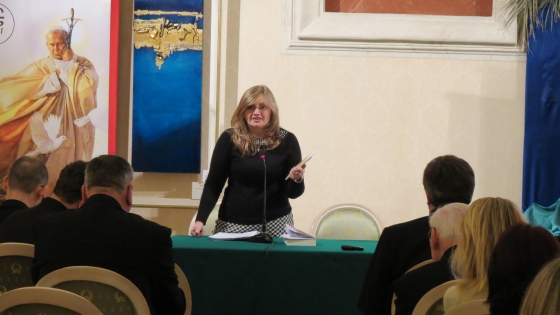“What is the human heart for?” – this was the motto of a meeting at St. Stanislaus church in Rome, 2 December. The meeting was devoted to Karol Wojtyła’s teaching on love and marriage. It was organized by the John Paul II Pontificate’s Center for Research and Documentation and the Pastoral Staff for Poles in Rome. The answer to the question presented in the title was addressed in the writings of Karol Wojtyła and presented by Fr. PhD. Przemyslaw Kwiatkowski, lecturer from the Pontifical Lateran University in Rome. He employed a multimedia presentation, showing photos from the time Karol Wojtyła had spent in Krakow and enriching this with quotations from his books and correspondence with marriages. The lecture was a theological and existential commentary on the presentation, and strictly speaking, on the life of Fr. Wojtyła and his friendship with young people, with marriages and families.
Fr. Kwiatkowski reminded us that the question “What is the human heart for?” – appears in the drama The Jeweler’s Shop by Karol Wojtyła. It is a question about the sense of life, and a call to communion with another human being. Fr. Wojtyła knew that the answer to this question could not be abstract, it must “go through” everything we are. In the sonnets of his youth it showed the motive of love as a force that is able to brighten up any darkness. Young people who gathered around Fr. Wojtyła, created the environment of free people seeking truth about life and the connection of humans with the truth of God. Life at that time required a courageous declaration for Christ and young people needed guides such as Fr. Wojtyła and Fr. Pietraszko. Thanks to their spiritual support those young people built families capable of evangelization, of being witnesses to a great love. One of those families was formed by the marriage of Danuta and Jerzy Ciesielski. The speaker brought up their story and mentioned a tragic accident in Sudan, which claimed the lives of Jerzy and his two children. He spoke about their role in the life of K. Wojtyła. He noted that the book Love and Responsibility (1960) was born under the influence of conversations with young people, to a large extent with Danuta and Jerzy.
Also, thanks to the aforesaid marriages, he understood more deeply the truth that, as a bishop, he represented Christ, the Bridegroom of the Church, and His love for people. Bridegroom – Christ “follows the way of human love”. Fr. Karol Wojtyła followed Christ and it is the reason why he shared the experience of young people, why he accompanied them in their process of maturing into true love, which consists in denial of egoism and in offering of oneself to another. To bring up to marriage is to prepare young people to a love that is capable of self-giving and self-sacrifice. Therefore, he emphasized the development of the spirituality of marriage, so that in the foreground there is the love of Christ and with that love, the love towards the spouse is united. Fr. Kwiatkowski also mentioned Bishop Wojtyła’s retreat for engaged couples, entitled Building a house on the rock from 1960, which has recently been published for the first time. These are three meditations concerning the marital oath. “Love is still growing” – these words Bishop Wojtyla mentioned in a retreat, after a young man shared his experience with him after a few years of marriage. Christ through the sacrament of marriage shows exactly this direction of “love growing”, so that it would mature in responsibility and it would be an evangelical sign that God loves man and it would be an incunabulum of a new humanity.
After the lecture a discussion arose. Anna Burzynska, who has twenty years of experience in counselling families at the church of St. Stanislaw in Rome, shared a testimony concerning the preparation of engaged couples for marriage, talking about timeliness of the teaching of Wojtyła. It was noted as well that Cardinal Wojtyła insisted that love is not only about giving, but also about being able to receive love from others. It was emphasized that looking at older marriages one can understand easier that marriage is like creating one “common organism”. It was also indicated that the Church should courageously, despite the difficulties and obstacles, present marital love to young people, because it is able to move people’s hearts and make it beat for great love.
